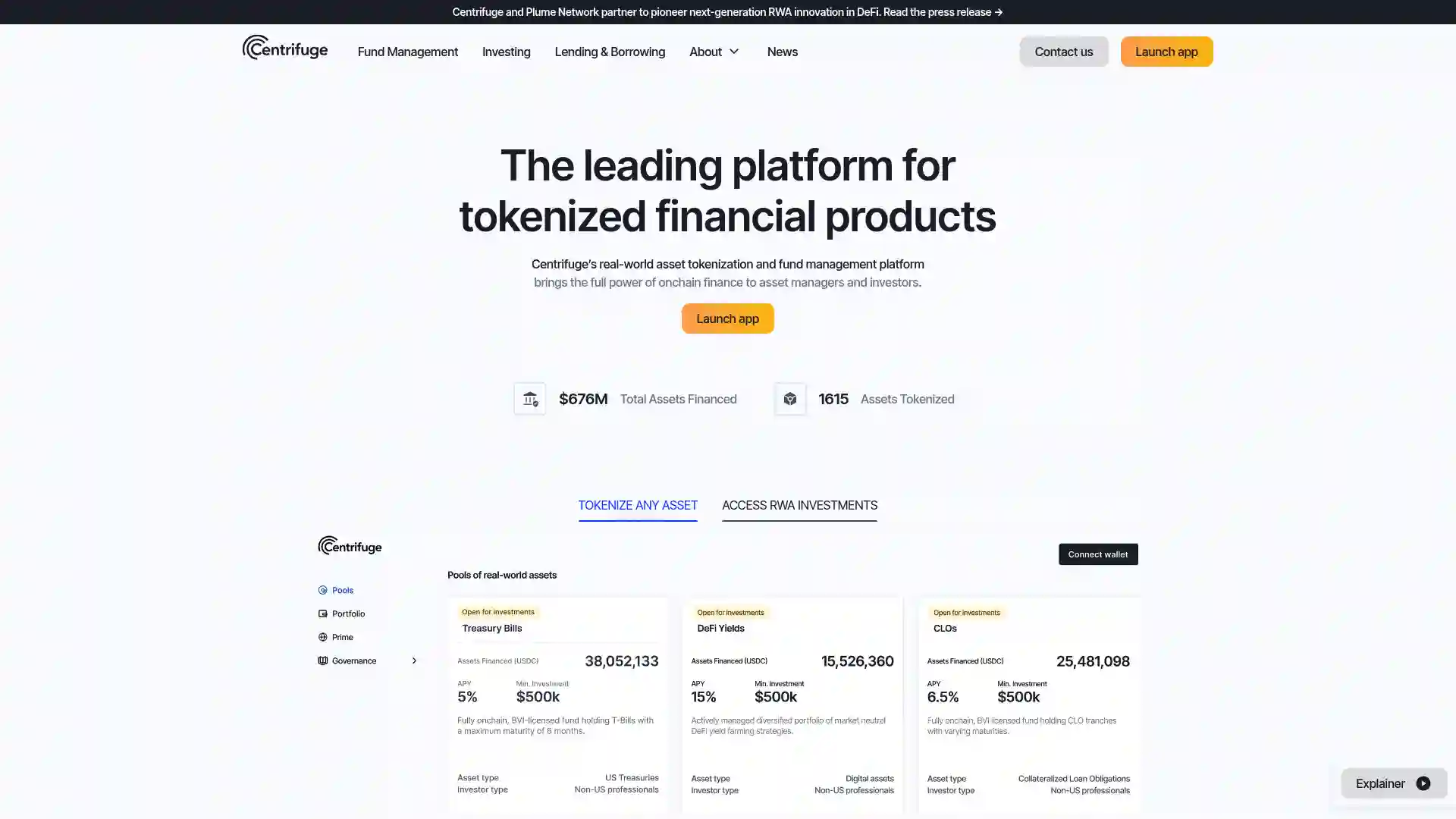Centrifuge (CFG)
Centrifuge is a platform focused on onchain finance and the tokenization of real-world assets, allowing investors to access a wide variety of assets. This framework is designed to improve transparency and offer investors enhanced portfolio insights.
History of Centrifuge
Centrifuge was established in 2017 to address inefficiencies in the financial system using blockchain technology. In 2021, it integrated the first real-world asset pool with MakerDAO, marking the first time a stablecoin (DAI) was backed by real-world assets. Later that year, the RWA Market was launched, utilizing the Aave protocol to provide liquidity to RWAs on Centrifuge.

| Ticker | CFG |
| Category | Polkadot Ecosystem |
| Website | https://centrifuge.io/ |
| @centrifuge | |
| Telegram | centrifuge_chat |
| https://www.reddit.com/r/Centrifuge/ |
By October 2022, BlockTower Credit became the first institutional credit fund to bring its collateralized lending operations onchain, funding $220 million of real-world assets through Centrifuge, with MakerDAO providing $150 million of senior capital. In 2023, Centrifuge introduced Centrifuge Prime to assist DeFi-native organizations in managing real-world assets. The same year, the first Real-World Asset Summit was held, and Centrifuge became a founding member of the Tokenized Asset Coalition. Later in 2023, Liquidity Pools were launched, enabling investment across EVM-based chains.
Onchain fund management platform
In March 2024, Centrifuge launched a fund management platform designed to onboard credit funds to public blockchains, making fund management more seamless. Lucas Vogelsang, co-founder of Centrifuge, emphasized the platform's ability to entice asset managers to tokenize their funds with enhanced reporting and automation capabilities.
Funding
In November 2022, Centrifuge announced a $4 million strategic funding round led by Coinbase Ventures, with participation from L1 Digital and Scytale. Earlier that year, BlockTower Capital announced a $3 million strategic partnership with Centrifuge. Lucas Vogelsang, CEO and Co-Founder, highlighted the role of partners like Coinbase and BlockTower in building infrastructure for onchain secured credit.
Overview of Centrifuge
Centrifuge provides the necessary infrastructure for tokenizing, managing, and investing in a diverse portfolio of real-world assets, fully collateralized to offer investors legal recourse. The protocol accommodates various asset classes, including structured credit, real estate, US treasuries, carbon credits, and consumer finance. The ecosystem includes a DAO supported by finance professionals and developers, aiming to bring structured credit to the blockchain for enhanced transparency.
Products of Centrifuge
Centrifuge Chain
Centrifuge Chain is a layer-1 blockchain designed for financing real-world assets (RWAs). It manages pools, assets, tranches, governance, the treasury, and the CFG token. Real-world assets are tokenized as NFTs to create an onchain representation linked to detailed off-chain data. Centrifuge Chain facilitates the integration of traditional financial systems with onchain RWAs, using the CFG token for onchain governance.
Centrifuge App
The Centrifuge App serves as an interface for investors to invest in RWAs and for issuers to manage asset pools. It operates on supported EVM chains and connects directly with Centrifuge Chain. The app’s integration with Liquidity Pools allows users to invest without switching chains.
Liquidity Pools
Centrifuge's Liquidity Pools consist of smart contracts deployable on any EVM chain, enabling investment in Centrifuge pools without leaving native chains.
Centrifuge Prime
Centrifuge Prime is tailored for onchain organizations like DAOs and protocols, simplifying the onboarding and scaling of real-world asset portfolios, addressing both technical and legal aspects.
CFG Token
CFG is the native token of Centrifuge, facilitating governance and transaction payments on Centrifuge Chain. Governance proposals require CFG token holders' approval to implement changes.
Governance
CFG tokens enable participation in governance through an onchain voting mechanism, allowing holders to vote on runtime upgrade proposals, which are enacted programmatically if approved.
Tokenomics and distribution
The CFG token exists on Centrifuge Chain and can be bridged to Ethereum as an ERC-20 token. The initial CFG Generation Event resulted in the creation of 400 million CFG, distributed among the Foundation, initial contributors, core team, investors, and validators. Additional tokens are minted as rewards to incentivize adoption and ensure chain security.
